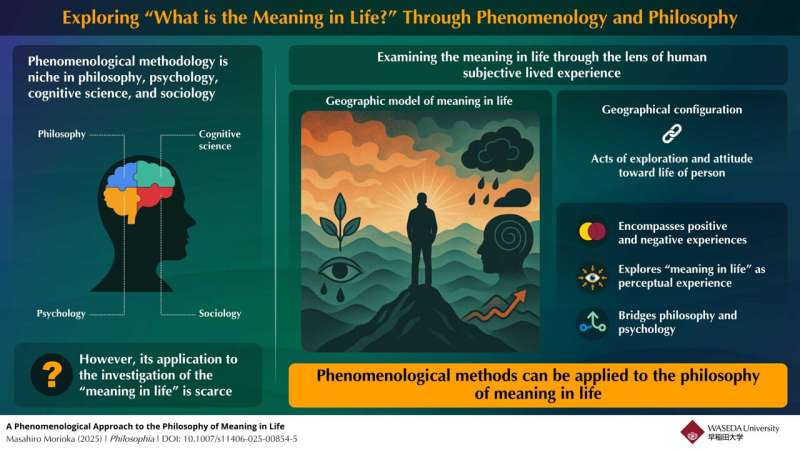Science
Waseda University Study Redefines Life’s Meaning Through Phenomenology

Psychological and philosophical research has long examined how emotions significantly influence a person’s perception of life’s meaning. A recent study led by Professor Masahiro Morioka at Waseda University proposes a novel approach by applying phenomenological concepts to explore “meaning in life.” The findings, published online in the journal Philosophia on June 4, 2025, suggest that the way individuals engage with their lives deeply shapes their understanding of meaning.
Philosopher Matthew Ratcliffe has highlighted how mood operates in the background of perception, affecting how individuals interpret their life’s significance. Empirical studies in psychology support this view, demonstrating that emotional states can alter the perception of meaning. In this context, the study moves beyond traditional debates regarding whether life’s meaning is subjective or objective, focusing instead on the dynamic interactions between individuals and their lived experiences.
The research introduces a “Geographic Model of Meaning in Life,” which posits that the exploration of one’s life—through varied attitudes and commitments—elicits different responses from life itself. These responses can manifest as experiences of meaning or suffering, suggesting that life’s value is shaped by the individual’s engagement with their surroundings. As Morioka explains, this model illustrates that “meaning in life” is akin to a geographical configuration formed by the individual’s actions and experiences.
The study emphasizes that both meaningful and tragic experiences coexist within an experiential landscape, marking a significant shift in understanding what constitutes a meaningful life. By integrating phenomenological methodologies, Morioka aims to bridge the gap between philosophy and psychology, fostering interdisciplinary collaboration.
Psychology has developed various methods to measure perceived life meaning, yet the geographic model offers a fresh perspective, potentially yielding new insights into psychological well-being. Morioka’s future objectives include integrating this study with other philosophical approaches to create a systematic framework for understanding life’s meaning.
This research not only contributes to academic discourse but also has practical implications for individuals seeking a deeper understanding of their life experiences. As Morioka reflects on his work, the potential for broader applications in both philosophy and psychology is evident, paving the way for new explorations into the nuances of human existence.
For further reading, Morioka’s detailed findings can be accessed in the publication titled “A Phenomenological Approach to the Philosophy of Meaning in Life” in Philosophia (2025).
-

 Lifestyle5 months ago
Lifestyle5 months agoLibraries Challenge Rising E-Book Costs Amid Growing Demand
-

 Sports5 months ago
Sports5 months agoTyreek Hill Responds to Tua Tagovailoa’s Comments on Team Dynamics
-

 Sports5 months ago
Sports5 months agoLiverpool Secures Agreement to Sign Young Striker Will Wright
-

 Lifestyle5 months ago
Lifestyle5 months agoSave Your Split Tomatoes: Expert Tips for Gardeners
-

 Lifestyle5 months ago
Lifestyle5 months agoPrincess Beatrice’s Daughter Athena Joins Siblings at London Parade
-

 Science4 months ago
Science4 months agoSan Francisco Hosts Unique Contest to Identify “Performative Males”
-

 World5 months ago
World5 months agoWinter Storms Lash New South Wales with Snow, Flood Risks
-

 Science5 months ago
Science5 months agoTrump Administration Moves to Repeal Key Climate Regulation
-

 Business5 months ago
Business5 months agoSoFi Technologies Shares Slip 2% Following Insider Stock Sale
-

 Science5 months ago
Science5 months agoNew Tool Reveals Link Between Horse Coat Condition and Parasites
-

 Sports5 months ago
Sports5 months agoElon Musk Sculpture Travels From Utah to Yosemite National Park
-

 Science5 months ago
Science5 months agoNew Study Confirms Humans Transported Stonehenge Bluestones









